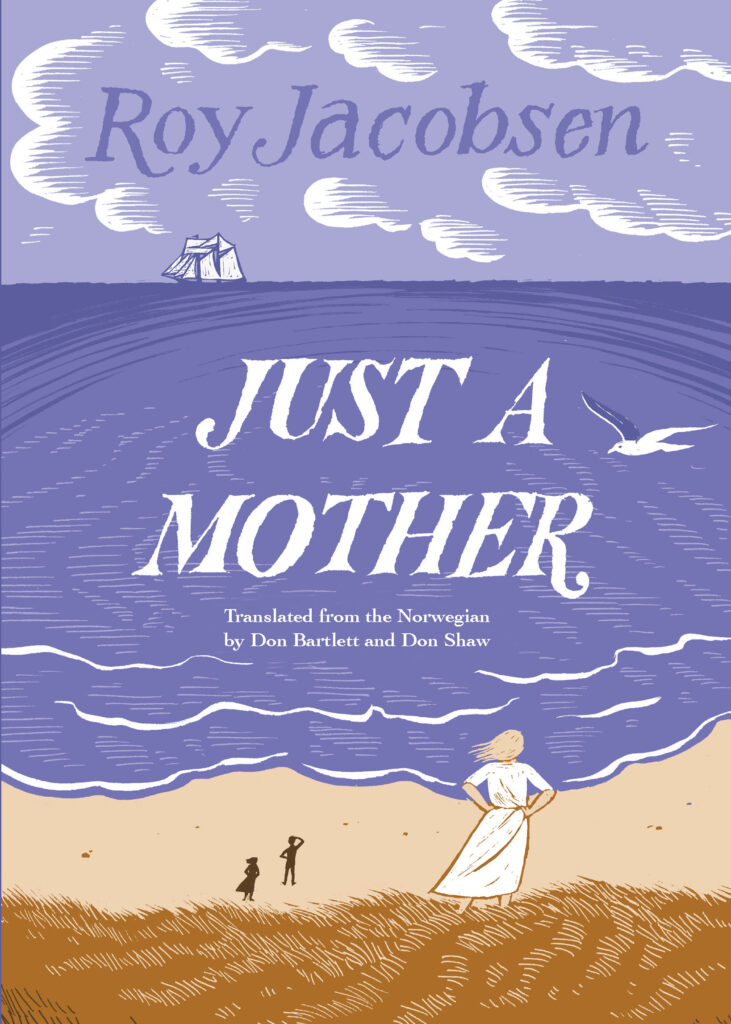
On a sparsely populated island any arrival at the quay, even a wretched milk boat, triggers some kind of activity. Today, the skipper leaned over the gunwale of the old fishing cutter and handed Ingrid the newspaper, as if it were a receipt for the milk churns he was hoisting aboard, slowly and painstakingly. This is what Johannes Hartvigsen will be remembered for, his laborious, ponderous manner.
But on this occasion a letter fell out of the newspaper, from Trondheim, bearing postage stamps Ingrid had never seen before, and the sender’s name and address on the back. Ingrid flushed, let the newspaper drop onto the quay and slowly set off south across the island.
She walked past the Swedes’ boathouse and the iron peg hammered into solid rock, heading towards the Lundeskjære skerries, agitated and barefoot, over boulders and warm, sea-smoothed rocks, through the parched heather and yellowing grass, holding a letter that would have to be read in solitude, there was no doubt about that, a letter from the unpredictable Mariann Vollheim, whom Ingrid had not heard from for years, and whom she had done her best to forget — to no avail, she realised with tremulous clarity.
She walked on past Love Spinney and over the rocks to Bosom Acre, for some reason still with the image of the milk-run skipper on her retinas, the sun-tanned, calloused hand of Johannes passing her the newspaper, together with a letter today, a mystery in itself, as Barrøy didn’t receive post at any time of the year apart from during the Lofoten season, and even then, only very few brief messages from the men of the island, to confirm they were still alive.
In her mind’s eye, behind the skipper she saw the oily deck in the sparkling sunlight, the port gunwale with its knife-holders and whetstones and coils of rope, beyond them the tranquil sea and the skerries and the islets where the motionless gulls made less and less noise as every new day moved the land further into autumn.
But most of all she saw the skipper’s four- or five-year-old son, Mattis, who once again was sitting on the hold hatch, the poor slavering wretch, in far too tight, ragged clothes, vomit all down his chest, three fingers in his mouth, a clumsy, shoeless boy to whom Ingrid was in the habit of addressing a few kindly words:
Hvur’s it goen, Mattis? Has tha bin sick?
In the hope of injecting some life into this apathetic creature who had been a regular fixture on the boat ever since his mother went missing one day in the early summer, for reasons no-one believed. The end of the war was too recent for there not to be some connection between the two. At any rate, no-one had taken the missing woman’s whining about the hardship and tedium in Johannes Hartvigsen’s house seriously, there had never been less hardship, and tedium was no more than a modern term for sloth. There was definitely no plausible reason for turning one’s back on husband and child and allowing oneself to be swallowed up in a city’s seething mass of humanity, and then not even to send some sign of life, there was no other possible explanation, of course it had something to do with the war.
*
Mattis’ mother was Olavia Hartvigsen, her maiden name was Storm, from a very “good” family on the landed estate in the north of the main island, an attractive girl who had manoeuvred her way confidently and graciously through her childhood and adolescent years before, in the final phase of the war, breaking with all the privileges accorded by Providence and going off to live with Johannes Hartvigsen, who was twice her age and whom not a single woman up to that time had dignified with a glance. The question was whether she had done this of her own free will. Hardly. Out of love? Not a chance. With suspicious intentions? Without a doubt.
At least that meant the flight from Johannes was not forced upon her?
With the consequence, however, that from then on the archipelago’s daily lifeline was run not only by an abandoned husband but also by his even more abandoned son, who, day in, day out, sat on the swaying deck of the cutter with three fingers in his mouth, waiting for the boat to put in at some quay or other, such as Barrøy, so that his insides could settle for a moment and one of the islanders might take pity on him with a kind word, which of course he never reciprocated, but acknowledged nonetheless, that was Ingrid’s impression, with a slight flinch, which she could see now as she trudged south carrying the puzzling letter that had nothing to do with the poor lad.
Occasionally two separate things happen concurrently and merge into one and the same wound, in one’s memory, except that you don’t realise this until it is too late. So why didn’t Ingrid pull herself together and tear open the envelope and read what Mariann had on her mind and get it over and done with?
Ingrid wasn’t ready, she carried on walking to Barrøy’s southernmost point, to the Bench, as they called it, the mighty Russian larch a storm had cast ashore at one time in her childhood, where she used to go to process her innermost thoughts, where she sat when the island threatened to become too small for her, when life threatened to come to a halt. And today, holding the letter from Mariann Vollheim, she was petrified.
__________________________________
From Just a Mother by Roy Jacobson. Used with permission of the publisher, Biblioasis. Copyright © 2023 by Roy Jacobson.


